Top Rankings
West New York School District ranks among the top 20% of public school district in New Jersey for:
Category
Attribute
Community Size
Largest student body (number of students) (Top 1%)
For the 2025 school year, there is 1 public preschool serving 403 students in West New York School District.
Public Preschools in West New York School District have a diversity score of 0.28, which is less than the New Jersey public preschool average of 0.71.
Minority enrollment is 93% of the student body (majority Hispanic), which is more than the New Jersey public preschool average of 64% (majority Hispanic).
Overview
This School District
This State (NJ)
# Schools
9 Schools
924 Schools
# Students
7,409 Students
368,931 Students
# Teachers
519 Teachers
33,283 Teachers
Student : Teacher Ratio
14:1
14:1
District Rank
West New York School District, which is ranked within the bottom 50% of all 646 school districts in New Jersey (based off of combined math and reading proficiency testing data) for the 2021-2022 school year.
The school district's graduation rate of 77% has decreased from 79% over five school years.
Overall District Rank
#529 out of 650 school districts
(Bottom 50%)
(Bottom 50%)
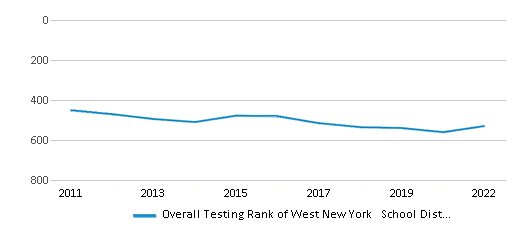
Math Test Scores (% Proficient)
19%
36%
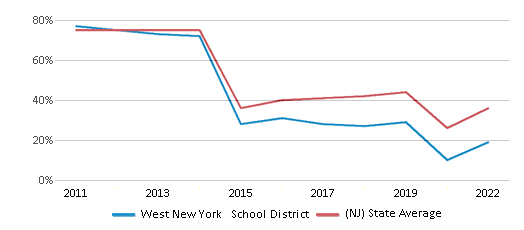
Reading/Language Arts Test Scores (% Proficient)
34%
49%
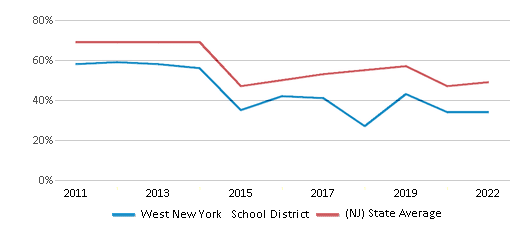
Science Test Scores (% Proficient)
7%
23%
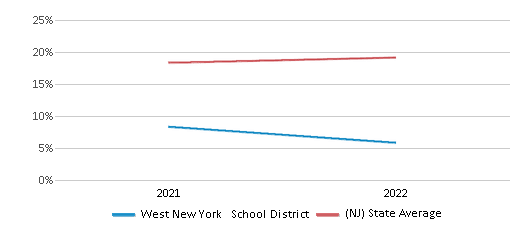
Graduation Rate
77%
85%
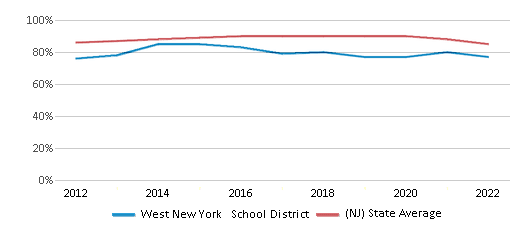
Students by Ethnicity:
Diversity Score
0.11
0.71
# American Indian Students
n/a
901 Students
% American Indian Students
n/a
n/a
# Asian Students
82 Students
30,033 Students
% Asian Students
1%
8%
# Hispanic Students
7,004 Students
132,928 Students
% Hispanic Students
95%
36%
# Black Students
68 Students
58,834 Students
% Black Students
1%
16%
# White Students
224 Students
132,766 Students
% White Students
3%
36%
# Hawaiian Students
1 Student
790 Students
% Hawaiian Students
n/a
n/a
# Two or more races Students
29 Students
12,631 Students
% of Two or more races Students
n/a
4%
Students by Grade:
# Students in PK Grade:
403
59,693
# Students in K Grade:
508
56,070
# Students in 1st Grade:
506
51,032
# Students in 2nd Grade:
541
50,036
# Students in 3rd Grade:
514
42,983
# Students in 4th Grade:
529
37,934
# Students in 5th Grade:
485
29,352
# Students in 6th Grade:
545
15,586
# Students in 7th Grade:
532
11,676
# Students in 8th Grade:
546
11,589
# Students in 9th Grade:
580
663
# Students in 10th Grade:
591
626
# Students in 11th Grade:
603
579
# Students in 12th Grade:
526
1,080
# Ungraded Students:
-
32
District Revenue and Spending
The revenue/student of $24,961 in this school district is less than the state median of $26,931. The school district revenue/student has stayed relatively flat over four school years.
The school district's spending/student of $23,611 is less than the state median of $25,828. The school district spending/student has stayed relatively flat over four school years.
Total Revenue
$185 MM
$36,642 MM
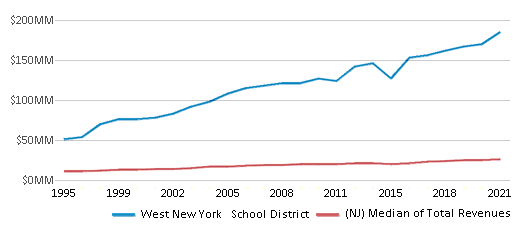
Spending
$175 MM
$35,142 MM
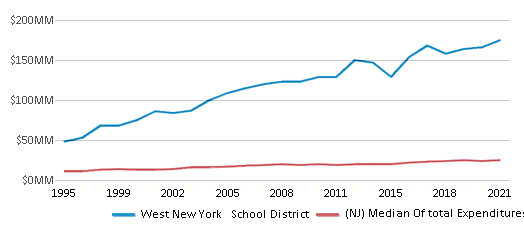
Revenue / Student
$24,961
$26,931
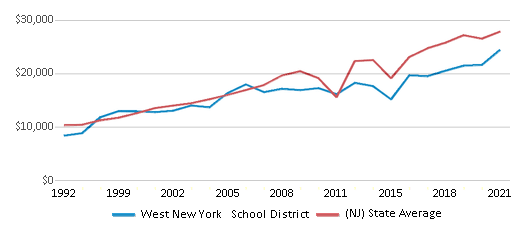
Spending / Student
$23,611
$25,828
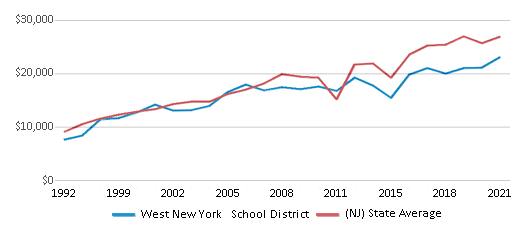
Best West New York School District Public Preschools (2025)
School
(Math and Reading Proficiency)
(Math and Reading Proficiency)
Location
Grades
Students
Rank: n/an/a
5204 Hudson Ave
West New York, NJ 07093
(201) 553-4035
West New York, NJ 07093
(201) 553-4035
Grades: PK
| 403 students
Recent Articles

Year-Round Or Traditional Schedule?
Which is more appropriate for your child? A year-round attendance schedule or traditional schedule? We look at the pros and cons.

Why You Should Encourage Your Child to Join a Sports Team
Participating in team sports has a great many benefits for children, there is no doubt. In this article you will learn what those benefits are.

White Students are Now the Minority in U.S. Public Schools
Increasing birth rates among immigrant families from Asia and Central and South America, combined with lower birth rates among white families, means that for the first time in history, public school students in the United States are majority-minority. This shift in demographics poses difficulties for schools as they work to accommodate children of varying language abilities and socio-economic backgrounds.





